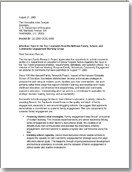The Harvard Family Research Project separated from the Harvard Graduate School of Education to become the Global Family Research Project as of January 1, 2017. It is no longer affiliated with Harvard University.

|
April 2011 Commentary from Harvard Family Research Project on the Promise Neighborhoods ProgramHarvard Family Research Project |
Article Information
- Full Text (HTML)
- Full Text (PDF: 59 kb)
Read commentary from the National Family, School, and Community Working Group
The National Family, School, and Community Working Group also submitted recommendations for the Promise Neighborhoods program’s proposed priorities, requirements, definitions, and selection criteria.
About the Promise Neighborhoods Program
The Promise Neighborhoods Program brings together families, community organizations, educational programs, and schools to improve the educational outcomes of children living in impoverished neighborhoods. The program’s vision is that all children living in a Promise Neighborhood will grow up with access to a high-quality school and a network of family and community supports that will prepare them for college and a career. Planning grants were first awarded to 21 grantees in September 2010.
The U.S. Department of Education has announced the 2011 competition for funds to assist with the planning and implementation of Promise Neighborhoods strategies.
Read the official notice posted by the U.S. Department of Education on the Federal Register.
Harvard Family Research Project’s commentary
Harvard Family Research Project (HFRP) submitted recommendations to the National Register Notice regarding the Promise Neighborhoods program's proposed priorities, requirements, definitions, and selection criteria. HFRP endorsed the comments submitted by the National Family, School, and Community Engagement Working Group, a collaborative of leaders in the family engagement field including HFRP’s Heather Weiss.
Additionally, HFRP recommended aligning family and community support indicators with education indicators to more easily assess how family and community engagement strategies relate to educational results. In addition, because the arts and humanities are one of eight priority areas in the Promise Neighborhoods program, HFRP suggested adding a new result and corresponding indicators to address this branch of learning. And, finally, HFRP recommended including student results that focus on skills students will need to succeed in a twenty-first century global economy—such as problem-solving, critical thinking, communication, creativity, collaboration, and self-directed learning.
Free. Available online only.
